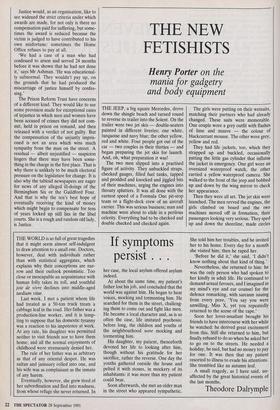If symptoms
persist . . .
THE WORLD is so full of great tragedies that it might seem almost self-indulgent to draw attention to a small one. Doctors, however, deal with individuals rather than with statistical aggregates, which explains why their conceptions are nar- row and their outlook pessimistic. Too close or inescapable an acquaintance with human folly takes its toll, and youthful joie de vivre declines into middle-aged taedium vitae.
Last week, I met a patient whom life had treated as a 50-ton truck treats a cabbage leaf in the road. Her father was a production-line worker, and it is temp- ting to suppose that his domestic tyranny was a reaction to his impotence at work. At any rate, his daughter was permitted neither to visit friends nor to have them home; and all the normal enjoyments of childhood were strenuously denied her.
The rule of her father was as arbitrary as that of any oriental despot. He was sultan and janissary rolled into one, and his wife was as complaisant as the inmate of any harem.
Eventually, however, she grew tired of her subordination and fled into madness, from whose refuge she never returned. In her case, the local asylum offered asylum indeed.
At about the same time, my patient's father lost his job, and concluded that the world was against him. He began to hear voices, mocking and tormenting him. He searched for them in the street, challeng- ing them to come out and fight like men. He became a local character and, as is so often the case, life imitated psychosis: before long, the children and youths of the neighbourhood were mocking and tormenting him.
His daughter, my patient, thenceforth devoted her life to looking after him, though without his gratitude for her sacrifice, rather the reverse. One day the youths gathered outside the house and pelted it with stones, in mockery of its inhabitants: it was more than my patient could bear.
Soon afterwards, she met an older man in the street who appeared sympathetic. She told him her troubles, and he invited her to his home. Every day for a month she visited him; then he raped her.
`Before he did it,' she said, 'I didn't know nothing about that kind of thing.'
Nevertheless, she returned to him: he was the only person who had spoken to her kindly in adult life. He continued to demand sexual favours, and I imagined in my mind's eye and ear counsel for the defence remarking, with sarcasm issuing from every pore, 'You say you were unwilling, Miss X, yet you repeatedly returned to the scene of the rape.'
Soon her lover-assailant brought his friends to have intercourse with her while he watched: he derived great excitement from this. Still she returned to him, but finally refused to do so when he asked her to go on to the streets. He needed a holiday, he said, but had no money to pay for one. It was then that my patient resorted to illness to evade his attentions. She trembled like an autumn leaf.
A small tragedy, as I have said, un- affected by the great historical events of the last months.
Theodore Dalrymple


































































 Previous page
Previous page